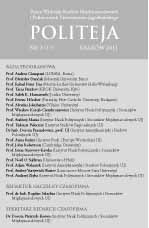Inter-Services Intelligence (ISI)
Inter-Services Intelligence (ISI)
Author(s): Aleksander GłogowskiSubject(s): Politics / Political Sciences
Published by: KSIĘGARNIA AKADEMICKA Sp. z o.o.
Summary/Abstract: The ISI (Inter -Services Intelligence) is the major intelligence agency of the Islamic Republic of Pakistan. It had played a major role in the so -called “Afghan Jihad” – the struggle of Mujahedeen against the 1979 -1989 Soviet war in Afghanistan. It has got also the reputation of a major political power which supported the military regime of gen. Zia ul -Haq. ISI is usually called the “hidden government” because of the influence it has had since then. During the Soviet -Afghan war, ISI became not only a political, but also a business power, engaged in the smuggling of weapons and drug trafficking. The ISI’s role in the Taliban’s ascent to power is ambiguous. The military had some kind of monopoly in the “Afghan” direction of Pakistan’s foreign policy even when civilians served as prime ministers. Contacts between high -ranked ISI officers and Taliban leaders are not secret, but the character of those relations is under discussion. It is not known whether those contacts have a purely political/ideological background, or a business one as well. The fall of the Taliban after 9/11 undermined the strategic interests of Pakistan in the region. The Northern Alliance, which took power in Kabul, is considered by Islamabad as pro -Indian. Pakistanis are suspicious of Indian engagement in Afghanistan. It could be explained by the trauma which exists in Pakistan since the 1971s secession of Bangladesh. Pakistanis are worried that Indian intelligence would be interested in the ongoing support for separatist groups, esp. Baluchis and Pashtoons, using Afghan territory as their base. Therefore, Pakistan’s strategic interests lie in establishing in Kabul the most pro -Pakistan government possible. Some of ISI officers are suspected of ideological support for radical Islam, so their loyalty for the present secular government may be questionable.
Journal: Politeja - Pismo Wydziału Studiów Międzynarodowych i Politycznych Uniwersytetu Jagiellońskiego
- Issue Year: 8/2011
- Issue No: 17
- Page Range: 145-152
- Page Count: 8
- Language: Polish

